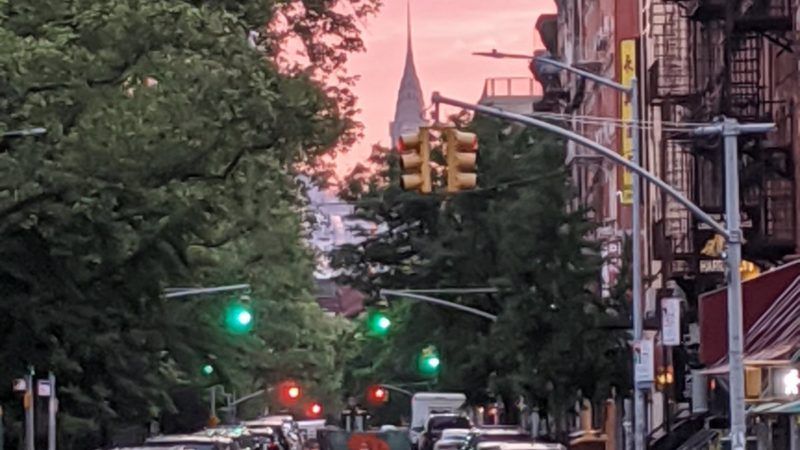I Can't Quit New York
How will residents of the City That Never Sleeps recover from being sentenced to their own apartments?

Friday afternoon, strolling down Smith Street in the brownstone neighborhood of Carroll Gardens, Brooklyn, I encountered a sight that made my heart leap with joy: Seven bars on a single small block, doors and windows flung open to the world, some for the first time this whole wretched spring.
"When did this open?" I asked one ecstatic-looking gal standing firmly inside the local institution Bar Great Harry. "Right now!" she blurted.
It's hard to pin your finger on the precise allure of New York and other major cities, but the right now is definitely up there. I can, right now, still walk to a handful of terrific butcher shops, bakeries, patisseries, coffee roasters, and craft breweries. (The organized looting brigades, thank goodness, haven't targeted these mom-and-pops, preferring the chain stores one mile away.)
The attraction of right now is also an inversion of the famous H.L. Mencken crack about Puritans: It's the pleasure of knowing that someone, somewhere nearby, may be experiencing happiness. Commerce—and not just the bar/café/restaurant kind enjoyed by the yutes—is most of the time a mutually gratifying exchange: I give Mr. Martinez the money he wants, he gives me the most dependably delicious avocados in the neighborhood; we inquire about each other's families. A city full of commerce—a city organized from its inception as a commerce-maximizing entity—is a place literally humming with satisfying intercourse.
But not right now. And maybe not anytime soon.
Tonight I'm supposed to have people over to my patio; they will be in violation of the law beginning at 8:01 p.m. Last night, for the first time since 1943, the City That Never Sleeps was ordered to go indoors after 11. We already lost 24-hour subway service last month; not that I've set foot in the station literally across the street from me over the past 84 days.
None of this feels natural, particularly after almost three months of sanity-straining coronavirus confinement. The good-weather season in New York is already way too short; pinning people inside their overtaxed apartments is at this point an act of cruelty.
Yet as irritating as that all is, I'm haunted more about what comes after the curfews and lockdowns are lifted. You just told a crowded cosmopolitan city to avoid people for an entire season. The center of American commerce, the place where (at most) you ask for forgiveness tomorrow rather than permission today, has spent months being told by people in power which types of commercial activity is and is not "essential." The basic physical reality of Manhattan and much of the other boroughs—people from all over the world packed like sardines in residences, restaurants, subway cars, and entertainment venues—is still considered deadly. And now anti-capitalist goons are roving mostly unmolested, smashing windows and stealing the product of late capitalism, night after night.
If you have the means, why would you stay? Indeed, nearly a half-million bailed from Manhattan in March and April alone; who knows many will come back. Anyone who has lived near the scar of previous riots—spreading from the intersection of Washington, D.C.'s 14th and U streets after 1968, for example—can tell you how permanent temporary window-boarding can become.
"Americans," wrote National Review critic and Manhattan resident Kyle Smith Monday night, in a depressing tweet-thread, "are going to flee the cities like we did in the post-68 era. 30 years of great progress for cities undone in one spring. Everyone gonna be moving to suburbs/exurbs & buying guns." It's hard to look at the realities of an exiting tax base, a strangled economy, and an abysmally feckless local political class, and not come to grim conclusions about vicious cycles.
And yet. About one month ago, my neighborhood-gadfly neighbor observed that just about when you get sick of one version of New York, a new one quickly springs up in its place. Last year looked a helluva lot different than 2002; the summer of 1990, crazy as that was to the eyes of a naïve 21-year-old Californian, bore little resemblance to the punk/burnout/decay of the late '70s. To watch the great Ric Burns documentary New York is to be made perpetually dizzy, dazzled, disgusted…the human and cultural and capitalistic and political churn just never ceases.
Even successful cities, as 1950s St. Louis or Cleveland can tell you, are not guaranteed to last. But in the great urban/suburban debate between Richard Florida and Joel Kotkin, I'm firmly with Florida: People who make long-term bets against New York City always lose.
Residents will flee, businesses will shut down, the economy will tank, prices will plummet…and then thrill-seekers will arrive, tourists will come back, marvelous inventions will spring up, and window-smashers will retreat. We can't possibly know what it all will look like, and that's part of the fun.
Or at least that's what I'm telling myself. At a time of rising—and risible—populism on the right and left, I prefer to make my stand for the cause of cosmopolitanism, commerce, international exchange, and inexplicable activity. To paraphrase another great American poet, if we can't make it here, maybe we can't make it anywhere. It would be much prettier to think that we could.
Watch Reason TV's more intellectual examination of this topic below:
